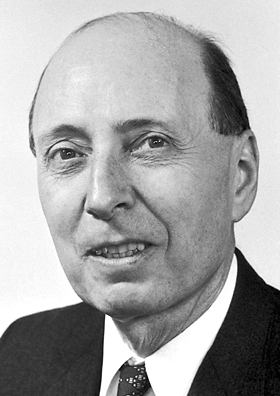Biographical memoir: "John von Neumann (1903 - 1957)" in Year book of the American Philosophical Society (1958); later in Symmetries and Reflections : Scientific Essays of Eugene P. Wigner (1967), p. 261
Kontextus: A deep sense of humor and an unusual ability for telling stories and jokes endeared Johnny even to casual acquaintances. He could be blunt when necessary, but was never pompous. A mind of von Neumann's inexorable logic had to understand and accept much that most of us do not want to accept and do not even wish to understand. This fact colored many of von Neumann's moral judgments. "It is just as foolish to complain that people are selfish and treacherous as it is to complain that the magnetic field does not increase unless the electric field has a curl. Both are laws of nature." Only scientific intellectual dishonesty and misappropriation of scientific results could rouse his indignation and ire — but these did — and did almost equally whether he himself, or someone else, was wronged.
Wigner Jenő: Idézetek angolul
Biographical memoir: "John von Neumann (1903 - 1957)" in Year book of the American Philosophical Society (1958); later in Symmetries and Reflections : Scientific Essays of Eugene P. Wigner (1967), p. 261
Kontextus: A deep sense of humor and an unusual ability for telling stories and jokes endeared Johnny even to casual acquaintances. He could be blunt when necessary, but was never pompous. A mind of von Neumann's inexorable logic had to understand and accept much that most of us do not want to accept and do not even wish to understand. This fact colored many of von Neumann's moral judgments. "It is just as foolish to complain that people are selfish and treacherous as it is to complain that the magnetic field does not increase unless the electric field has a curl. Both are laws of nature." Only scientific intellectual dishonesty and misappropriation of scientific results could rouse his indignation and ire — but these did — and did almost equally whether he himself, or someone else, was wronged.
"The Unreasonable Effectiveness of Mathematics in the Natural Sciences," Communications in Pure and Applied Mathematics, February 1960.
in an interview by [István Kardos, Scientists face to face, Corvina Kiadó, 1978, 963130373X, 370]
“Where in the Schrödinger equation do you put the joy of being alive?”
As quoted by Freeman Dyson from a private conversation, Infinite in All Directions (1988)
"The Unreasonable Effectiveness of Mathematics in the Natural Sciences," Communications in Pure and Applied Mathematics, February 1960, final sentence.
